By now, JAWS is a Hollywood institution. It not only birthed the summer blockbuster, but, like any popular new idea, it inspired countless knockoffs – a trend that continues to this day. Putting aside the more infamous examples, like the Italian-lensed CRUEL JAWS (yes, this is real) and Enzo G. Castellari’s THE LAST SHARK aka GREAT WHITE, both of which saw their U.S. releases halted by JAWS distributor Universal Studios due to obvious reasons, the “animals-run-amok” subgenre wasn’t actually confined just to sharks. Following the unparalleled success of JAWS, every kind of animal that could reasonably run amok ran amok, regardless if those animals had legs or not.
Even those animals (or insects) that weren’t obvious amok-runners still got their own one-word titles through which to generate “terror”: GRIZZLY, FROGS, SLUGS, BUG, ANTS, GI-ANTS, SQUIRM (about worms), etc.
Even automobiles got in on the action, like 1977’s THE CAR and 1974’s KILLDOZER.
It got pretty ridiculous.
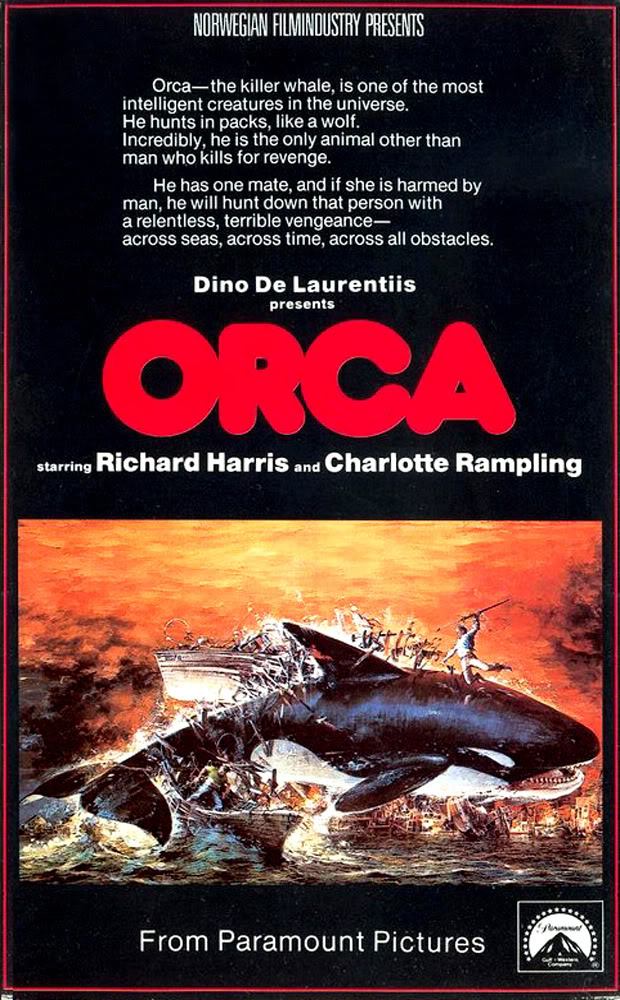
Addressing the great white in the room, ORCA, on its surface, could easily be written off as one of these JAWS bastards. It even takes the name of Quint’s doomed sea vessel for its title. Obviously, the similarities are profound. Sea-based killer animal? Check. Crusty, hard-drinking boat captain tasked with killing the beast? Check. A crew assembled with people of differing philosophies toward the animal and how it should be dealt with? Check. An entire town’s financial stability affected by the maniacal animal? Oh yes. And like JAWS, ORCA also gets a huge boost from its musical score – Ennio Morricone’s absolute all-time best, in fact.
Long dismissed as just another JAWS clone, ORCA is worthy of much more respectable appreciation – forty years after its release.
While out on a routine sharking expedition hoping to land a big payday for a local aquarium, Captain Nolan (Richard Harris) and the crew of his vessel, the Bumpo, get an up-close and personal encounter with an orca whale during a shark attack. Impressed with the size and savagery of the whale, Nolan switches targets, deciding that the capture of a male orca – alive – would fetch a much bigger payday. But after botching this capture and accidentally killing the targeted orca’s pregnant mate (which miscarries on the Bumpo in a devastating sequence), the orca becomes incensed, ramming the vessel and then stalking the murderous captain all the way back to shore – and beyond – intent on ruining his life by any means necessary. Even from the frigid ocean waters, the orca inexplicably begins to wear down Nolan in every feasible means – physically, mentally, financially, existentially, and philosophically. (If Hannibal Lecter were an animal, he would be an orca.) Soon, Captain Nolan is left with no choice but to take back to the sea and engage in a battle to the death with his massive opponent.
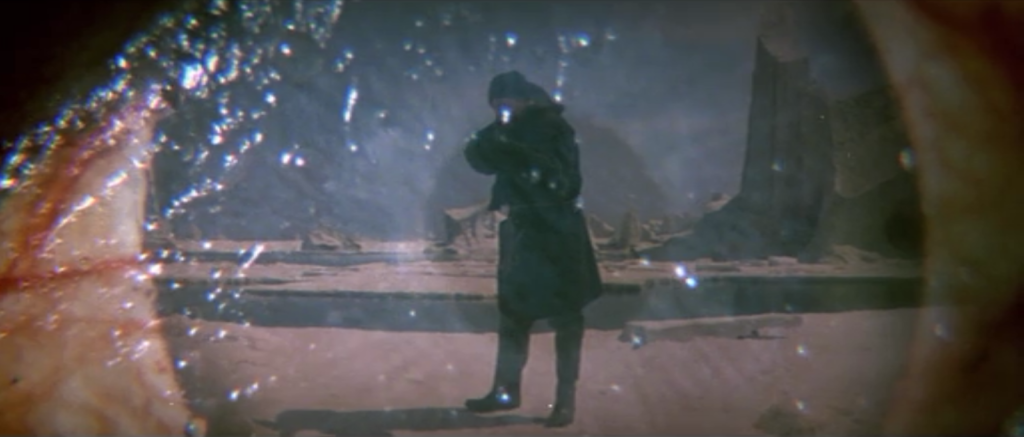
Yes, ORCA follows a lot of the same familiar JAWS beats, and though it pales in comparison, ORCA is much better than its reputation or immediate sketchy filmic colleagues would suggest. (The opening sequence, which sees the orca kill a great white shark in a violent battle, is a not-so-subtle dig at its legendary predecessor.) Based on the 1977 novel of the same name by Arthur Herzog, what sets ORCA off from its unintended brethren is the amount of sincerity with which it was made, with much of the credit going to director Michael Anderson (LOGAN’S RUN; 1984) for maintaining a level of seriousness and weaving a palpable sense of regret throughout what would otherwise be your standard animal-revenge thriller. ORCA is inherent with sadness and despair, from the quiet haunted life of Nolan to the vicious capture of the pregnant orca, right down to the icy finale which sees the crew being led to the unforgiving crushing ice caps and brutal cold of the Strait of Belle Isle. Not a single time during the film can the sun be glimpsed or does daylight look bright and warm. Colors are muted, and at dusk, barely present. Nolan and his crew live a shiftless life, existing only in those strange lands where their fishing work takes them. No one has any roots to speak of – the only relationships they have are with each other. All of this is purposeful; ORCA isn’t out for the same kind of adventurous thrills as JAWS, nor is it only interested in cheap but entertaining exploitation thrills like ALLIGATOR. Though the furious orca kills quite a few people, it’s not done for titillation like the usual sharksploitation flick. As each character sleeps with the fishes, you feel conflicted, even if these characters have shown off their ignorance toward the dangers that their profession can have on the ecosystem. Like real people, they’re flawed but not villainous, and none of them are particularly heroic; in fact, Nolan only gets up the gumption to resolve the conflict he’s inadvertently created because the town where he‘s temporarily docked blackmails him into doing it – even refusing to sell gasoline to the crew attempting to retreat from their sins. (Heroism!)
Aiding ORCA’s effectiveness is the slightly dangerous tone exhibited by ‘70s-era Italian thriller and horror films, which always had their own look and feel, and which were heightened in every sense – regardless of genre. Exploitation films were just a bit more exploitative. The infamous “cannibal horror” period was rife with filmmakers pushing boundaries – so much that murder charges were brought against CANNIBAL HOLOCAUST director Ruggero Deodato in response to the too-convincing fates that befell that film’s characters. This sensibility would spawn the giallo sub-genre – one that gleefully focused on the exaggeration of sex and sensuality, fluid and poetic camera movement, and, most famously, very specifically choreographed and violent murder sequences. The presence on ORCA of Italian producer Dino De Laurentiis, a major figure during this time (and who remained so until his death; he’d go on to produce several films in the Hannibal Lecter(!) franchise), and the largely Italian crew – from the script writers to the production and art designers – inadvertently rode that over-stylized subset of Italian filmmaking, which enhances ORCA’s sense of danger and unease; it comes across as similarly loose-cannoned and willing to push the boundaries of good taste, even though, except for the upsetting whale capture scene in the first act, ORCA is fairly restrained. (Though this is not at all applicable to ORCA’s production, Italian productions were also occasionally unkind to animals, which also enhances the unsettling usage of ORCA’s special effects. More on that in a bit.)
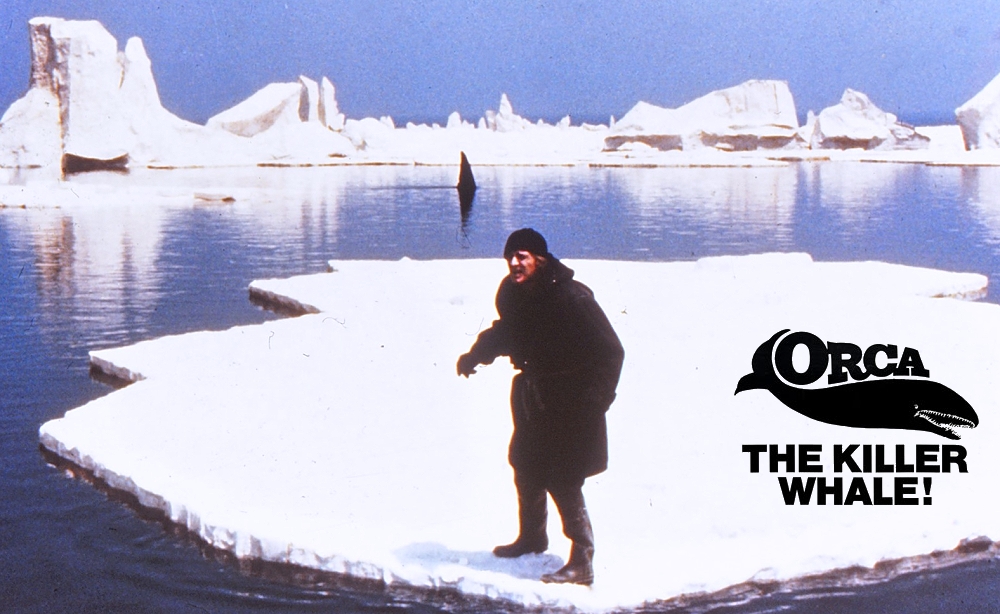
Richard Harris’ Captain Nolan is a heavy figure. The fisherman lives a life of isolation, having seen his pregnant wife perish in a car accident caused by a drunk driver – one that’s already taken place before the opening credits, but which can be unnervingly glimpsed through quick flashbacks complemented by the unsettling shrill shriek of an orca. The film draws parallels both obvious (the tragic loss of a burgeoning family) and subtle (obsession leading to self-destruction) between Nolan and the orca that hunts him, and which he then begins to hunt. As life took away Nolan’s family, so Nolan took away that of the orca. They become one and the same — two lost souls navigating a cold and barren seascape; satisfying the avenging beasts within them is the only thing offering them forward momentum.
The death scenes, too, are executed differently. Unlike JAWS, where the shark attack scenes were suspensefully predicated by John Williams’ famous low-end piano and Spielberg’s paranoid shots of the water, the death scenes here are quick and brutal, and over before you realize they’ve happened. The orca lunges with a shriek, takes his target, and disappears beneath the depths. It’s not at all about suspense this time around; it’s much more focused on shock – how, at one moment, you can be sitting safely on the bow of a ship, and at the next, you’re immediately disappeared as if you never existed. Again, a film that clearly exists because of what’s come before is still making an effort to distance itself through different stylistic choices. Yes, both films feature an aquatic killer as the main threat, but each is going about it as differently as they can while remaining in the same genre and delivering, ultimately, what the audience expects.
For its time, the special effects are quite good. Granted, some of the visual tricks, like superimposing together scenes of orcas breaching the ocean’s surface, show their age, but the practical effects are extremely lifelike to the point where certain shots look downright disturbing. Charlotte Rampling sitting on the beach next to the corpse of the orca that Nolan kills during the opening moments and seeing it rock and sway in the coming and going ocean tide offers it a very sad reality. (Production on ORCA was even momentarily shut down following outcry from animal rights groups after someone glimpsed a life-sized orca prop being trucked into the shooting location.) A brief shot of a pummeled great white shark floatingly lifelessly in bloody waters, too, looks alarmingly real. (It wasn’t; all underwater shark photography was captured by ocean conservationists Ron and Valerie Taylor, who famously obtained all the real shark footage used in…yep…JAWS.) Honestly, there are times when ORCA’s best special effects even look better than some of the troublesome effects from JAWS – and for a film that would go on to inspire a multi-billion dollar franchise and a theme park ride, that’s not dismissible praise.
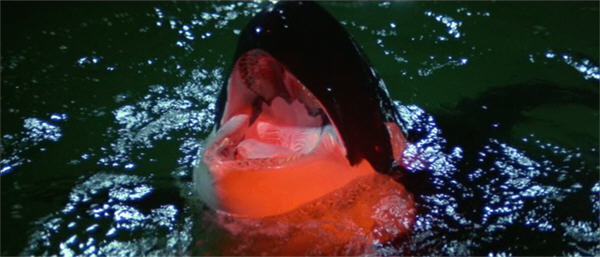
It’s fair to admit that ORCA would not exist without JAWS, but it would also be unfair to disregard ORCA as a lazy cash-grab. It has its own identity and purpose, and its own less traveled path for getting there – one might even argue that it has much more in common with Moby Dick than that aforementioned stillness in the water. As confirmed in the supplements on the recent Blu-ray from Australian distributor Umbrella Entertainment, Richard Harris once stated to have found the characters in its script far richer and more complicated than Brody, Hooper, and Quint, and that its label of being a mere JAWS rip-off was offensive. Charlotte Rampling, who works steadily to this day, continues to look back on the film with pride, expressing regret that her busy schedule left her unable to participate in those same supplements. Affirmations like these are important to preserving and fairly examining ORCA’S legacy. This isn’t a case where actors, who go on to more prominent roles in wider reaching films, look back on their horror past with embarrassment and dismissal. A good film is a good film, regardless of its genre, unfair reputation, and especially regardless of its inspiration.
ORCA recently enjoyed a region-free Blu-ray release from Umbrella Entertainment.
For further reading:
Our tribute to Luciano Vincenzoni, producer and writer of ORCA.
Jon Abrams on the movie he saw before JAWS, which he always thought was an ORCA knock-off.
The Daily Grindhouse staff on our favorite JAWS knock-offs.
Tags: Arthur Herzog, Bo Derek, Charlotte Rampling, Dino De Laurentiis, Ennio Morricone, Keenan Wynn, Luciano Vincenzoni, Michael Anderson, Nepo, Peter Hooten, richard harris, Robert Carradine, Robert Towne, Ron Taylor, Sergio Donati, Valerie Taylor, Will Sampson, Yaka

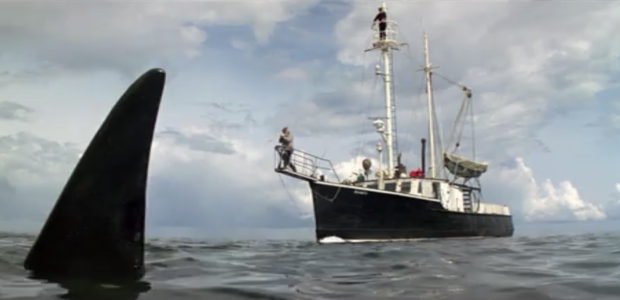
No Comments